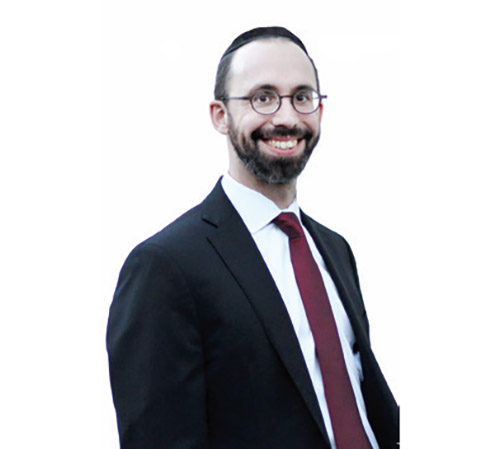
When Yaakov Grossman got engaged to his fianc? Aliza, their dream was to start the beginning of their marriage in Eretz Yisrael, with Yaakov spending his day immersed in Torah learning in the Mir yeshiva. The challenge was how would they be able to afford this dream?! Even with Yaakov giving haircuts, as he did when he was single, and his wife working, they still would not have enough income to meet their monthly expenses. They decided they would use the money they would receive as wedding gifts to finance their stay in Eretz Yisrael for as long as they could. Afterward they would move back to Montreal, where Yaakov would start his career. They felt this would be a worthy investment of their wedding gifts.
After their wedding they moved to Eretz Yisrael and Yaakov went back to full-time Torah study in Mir Yerushalayim, a dream come true. Together with their wedding money and the money they earned, they were able to stretch their stay for close to two years. They moved back to Canada with a young baby, Yaakov looking for a job, very little savings and the need to purchase all the furnishings for their apartment. Shortly after they arrived, Aliza attended a Chinese auction and purchased a ticket for a furniture package. She was extremely surprised and delighted when they called out her name as the winner of the furniture package! This set was much fancier than they ever would have imagined or dreamed of being able to afford. It was a clear reward from Hashem for their decision at the start of their marriage to dedicate themselves to Torah study in Eretz Yisrael.
A similar payback occurs in our parsha. Pinchas observes the serious desecration of Hashem’s name by the Jewish prince Zimri and the non-Jewish princess Cozbi, who engage in open illicit relations. Pinchas runs into their tent and spears the two of them in a zealous act to restore the sanctity of klal Yisrael. In return, Hashem blesses Pinchas with the gift of peace and harmony. But how could the reward for this violent act of vengeance be peace and harmony?
Our parsha is not the only place where we have this seeming contradiction. We find the same incongruity with the Ir Hanidachas—the city of Jews who are worshipping avoda zarah (idol worship), where the Torah commands us to wipe out all the inhabitants of the city. Yet, Hashem promises that all the participating soldiers will be blessed afterward with a compassionate and merciful nature (Parshas Re’eh). We know that killing develops a nature for cruelty, yet the Torah blesses all those involved in annihilating this town with the character trait of compassion!
Rav Tzadok Hakohen explains that doing a mitzvah does not create negative tendencies. In fact, it is just the opposite. When one participates in actions that normally develop a tendency for cruelty, but currently is done to fulfill a mitzvah, one’s inclination for compassion will be enhanced.
This is why Pinchas received the blessing of peace in exchange for his violent act.
Rav Tzadok says we find a similar phenomenon in the case of investments of money for a mitzvah. The Torah instructs individuals to give a tenth of their produce to the tribe of Levi. From here, the rabbis derive the mitzvah of ma’aser—giving a tenth of one’s earnings to charity. Understandably, giving charity to the needy is important and a key action in our developing compassion. However, the Gemara Taanis (9a) says shockingly that donating a tenth of one’s earnings to charity will actually make one rich. How is this so?
Similarly, the Gemara Shabbos (119a) attributes the wealth of the Jews in Eretz Yisrael during the Gemara era to the fact that they would spend large amounts of money to honor Shabbos.
Rav Tzadok explains that these results are rooted in the concept above, that an action performed for a mitzvah will only help generate good results, even when it normally might generate negative results. The same applies to an investment of money for a mitzvah. Spending money for a mitzvah, while temporarily depleting monetary resources, is really an insurance policy to be blessed with more and more wealth.
However, there is one condition for this formula to be successful: the mitzvah must be performed lishma—solely for the sake of fulfilling Hashem’s will—and not for any ulterior selfish motives.
The next time we are confronted with the opportunity to perform a mitzvah that involves a physical or monetary investment, let’s remember this lesson. The ROI—return on investment—of a mitzvah is not just in the next world, but even in this world! It’s a win-win situation. Good Shabbos.
By Rabbi Baruch Bodenheim
Rabbi Baruch Bodenheim is the associate rosh yeshiva of Passaic Torah Institute (PTI)/Yeshiva Ner Boruch. PTI has attracted people from all over northern New Jersey, including Teaneck, Paramus, Rockaway and Fair Lawn. He initiated and continues to lead a multi-level Gemara-learning program. Recently he has spread out beyond PTI to begin a weekly beis midrash program with in-depth chavrusa learning in Livingston, Fort Lee and a monthly group in West Caldwell. His email is [email protected].









